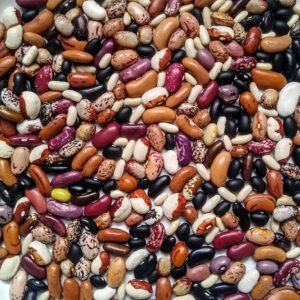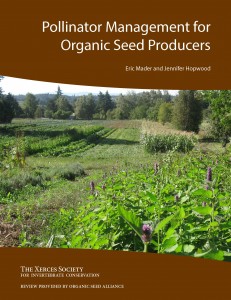
 From alfalfa to zucchini, it all begins with a seed. Whether you save seeds in your garden or produce seeds on a larger scale, considering pollination is a critical step. A new publication from the Xerces Society and Organic Seed Alliance provides clear strategies for conserving pollinators, managing crop isolation distances, and reducing unintended outcrossing between organic and non-organic seed crops.
From alfalfa to zucchini, it all begins with a seed. Whether you save seeds in your garden or produce seeds on a larger scale, considering pollination is a critical step. A new publication from the Xerces Society and Organic Seed Alliance provides clear strategies for conserving pollinators, managing crop isolation distances, and reducing unintended outcrossing between organic and non-organic seed crops.
Click here to download a PDF of the publication.
More than 80% of the world’s flowering plants depend on insect pollinators–especially bees–to produce seed, including more than two-thirds of all food crop species. Seed growers and seed savers can play a role in supporting declining managed and wild bees, while also benefiting from their pollination services. Organic seed producers face an additional challenge, the risk of genetic contamination of their seed crops (e.g. the movement of pollen from genetically modified crop varieties).
This new publication will aid organic seed producers in understanding the role and diversity of seed crop pollinators, as well as strategies for reducing pollen movement between organic and conventional farms. Profiles of common pollinators, strategies for managing pollination, and guidelines for specific crops are all included.
Beyond the value of pollinators to seed production, incorporating pollinator conservation into an organic farm system can also help growers meet the biodiversity requirements for organic certification, and can support beneficial insects that control crop pests.
Webinar: Pollinator Conservation Strategies for Organic Seed Producer
Saturday, February 1, 1:30 – 3:00 pm
This Organic Seed Growers conference workshop, also being offered as a webinar, will provide organic seed producers with the latest science-based information on maximizing crop yields through the conservation of native pollinators, while at the same time helping them to reduce the risk of outcrossing with non-organic crop varieties. Specific topics include the: ecology of specialist seed crop pollinating insects, foraging behaviors and flight range of key native bee groups (and the impact of those foraging ranges on crop isolation), bee-friendly farming practices, development of pollinator habitat on working farms, accessing USDA technical and financial resources for pollinator conservation, and more.
Through support from eXtension.org, this workshop is available as a webinar. To find out more about the webinar broadcast, or to register click here.
The Xerces Society is a nonprofit organization that protects wildlife through the conservation of invertebrates and their habitat. Established in 1971, the Society is at the forefront of invertebrate protection worldwide, harnessing the knowledge of scientists and the enthusiasm of citizens to implement conservation programs. To learn more about our work or to donate to the Society, please visit www.xerces.org.
